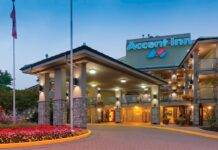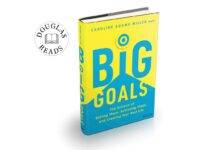He is a swaggering entrepreneur with a heart of gold, known throughout Victoria as a character who knows every other character in town. He is loud, abrasive, seemingly unembarrassable, and prone to reach for the joke in most situations.
This August, Siegel is celebrating the 30th anniversary of his landmark restaurant, Pagliacci’s, and it’s still a lineup-out-the-door kind of success story. It’s also been the moneymaker that let Siegel and his brother, David, buy some $20 million in Victoria commercial real estate, which they operate as Yentel Management. The properties include: the Maynard Court Heritage Building on Johnson, the building that houses Spice Jammer Restaurant at Fort and Quadra, the Ocean Island Backpackers Inn Building on Pandora at Blanshard, the adjoining building that houses the Women in Need shop and warehouse, the AIDS Vancouver Island building on Blanshard, the Big O Tires building on Quadra, the Canadian Springs Water Company building on Station Avenue in Langford, and the Lordco Auto Parts building on Jacklin Road in Langford.
Recently, Siegel and his partner, Janet Rothman, collaborated on a play, Before Play, which went on to win the 2007 Theatre BC Canadian National Playwriting Competition. Siegel now divides his time between Victoria and Phoenix, where Rothman works as a clinical therapist.
Siegel responded to questions from a Home Depot parking lot in Phoenix. He was on his way to “buy some nuts and screws.”
What are you doing in Phoenix?
I’ve got Dodgers season tickets. The Dodgers move to Phoenix for spring training in March. And I’m trying to get the play produced here.
Is there any money in being a playwright?
We just got our first royalty cheque for $300 to split between us.
Would you ever leave Victoria permanently?
Maybe for a seven-picture deal with Fox. But I can’t. In Victoria, I’m “Howie Siegel,” but in Duncan, I couldn’t get picked up hitchhiking. I owe everything I have to Victoria and Pagliacci’s.
You first lived in Canada on Lasqueti Island.
Yes, the biggest misconception about me is that I came to Canada as a draft evader. I was really a depressed comedian. I graduated from UCLA and was supposed to go to law school, but instead I tried to become a stand-up comic. That lasted about six months. I was with the William Morris agency for about three months, two of them on hold.
I got real depressed and travelled and found Canada, a country where nobody gave a damn if you were on the Tonight Show or not. I moved to Lasqueti Island, built my own cabin, grew marijuana, got muscles, started getting laid. I was working for a fish packer that went bankrupt. So, I decided to give Victoria a try. My friend Alan DiFiore [co-founder of Pag’s, along with the Siegels, and writer of CTV’s upcoming The Bridge] was writing commercials for CJVI and he falsified a resume for me that made it look like I had a career in advertising. CJVI hired me to write commercials for $200 a week. I remember I bought a couple of coffees and, with tip, it came to five dollars. And, as I walked out of the restaurant, I realized I had just spent 2 1/2 per cent of my weekly salary and that’s what inspired me to make a living.
What was the concept behind Pagliacci’s?
There was no concept. It was my brother David’s dream to open a restaurant and it was my dream to be able to afford to eat in one. I was 34, unmarried, and no children. I put $5,000 as my share to open the place. My personality had been formed. I wasn’t going to any hotel restaurant management school. All my instincts and values were formed by those 1930s movies I watched. How did those gangsters get treated when they went into a restaurant? I wanted to treat the women like they were Joan of Arc and the men like they were Bugsy Siegel. And give them that kind of greeting. Somebody comes in, recognize them immediately, and go get them something to eat. Quick, not yesterday. People in Canada didn’t know I was bringing a New York sense of haste and immediacy to things. And it did unnerve some of my staff because they thought it should be a relaxing situation. I thought people could go home if they wanted to relax. I brought a tension to things and, without tension, you have no drama. I didn’t sit down and think these things out. At the time, I was insane but it worked. I always honoured my customers. And the staff that I made cry, I apologized to them later.
What are the secrets of a restaurant’s success?
Nickel and diming disgusts me and still does. We don’t charge for extras, and it may not sound like a big thing but, in essence, it was against what everybody else was doing. If you want another meatball or another bowl of soup, we give it to you. And good portions — it bothers me when I get minuscule portions. The secret of restaurant business is to make people feel they’re getting a good deal and not being exploited. Give the kids something for free. You make a grateful family and they’ll come back for the rest of their lives.
How much business does Pag’s do in a year?
Close to three million. Everything I have came from that room. I met my wife there. One of our children was conceived there.
Any particular table?
No, it was on a built-in safe in the back.
And it allowed you to buy your own theatre, The Roxy Cinegog, which must’ve been a dream come true for you.
Actually my dream was to make movies not to show them.
Why did you sell The Roxy?
Romance forced my hand. I was personally running it and I needed to go to Arizona to be with Janet.
You had a discount double-feature policy. Did it make any money?
It made money for over 20 years. It did over a quarter million per year. I bought it for $130,000 in 1986 and sold it for almost a million.
Do you have any financial interest in your eldest son Solomon’s restaurant, Solomon’s?
I have no money in there. He mixes the best drink in the city.
Is Solomon’s competition for Pag’s?
I hope so. I hope he bankrupts us.
What do you think is going to happen with the economy?
Businessmen pretend to an expertise. They’ve tried in the last century to make the economy a science and pretend that they can control it. And they can’t. And they never have. They think they’re getting control of it, but it’s beyond their ken. We took over the world from God and said we’re not going to leave things to superstition and happenstance; we’re gonna control things, control the climate, the economy, the baseball games, our lives. And the truth is, it’s out of control. And the last thing a businessman will say to you is: “I have no idea why I’m rich, why I’m poor; I’m just lucky.”
What do you think you represent to people?
A guy who was able to make a living and have some fun at the same time. I didn’t have to distort my personality and values, and I brought some integrity to what I did, whether you like me or not. I didn’t have to sell my soul to make a living.























